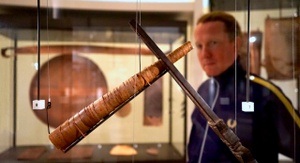HI BOSSI! Discussion: Wie wird die Filmbranche FLINTA-inklusiver?
In the organizer's words:
Hi BOSSI! Discussion: How can the film industry become more FLINTA-inclusive?
Women, lesbians, intersex, non-binary, trans* and a-gender people (FLINTA for short) are still severely underrepresented in the film industry. Inclusion is not only a question of justice, but also a strategic necessity in order to promote diversity and creativity in film production. What concrete steps can the film industry take to ensure participation and access for FLINTA in all positions? What proven methods already exist to combat discrimination in the industry? How can we break through the glass ceiling and create an inclusive film culture for FLINTAs? Discussing:
Brix Schaumburg (Queer Media Society = QMS), Germany's first officially outed trans* actor. The adjective, for which he often had to justify himself in the past, he now wears with pride in order to raise awareness and fight for equality. With power and lots of charm, he makes the world a little more colorful every day.
Dan Dansen (QMS) explores how everyday moments reveal the contradictions of life. As a Berlin-based non-binary filmmaker, Dan has just completed a hybrid feature film on trans* perspectives in early Europe. In the queerfeminist group "Lust & Krise", Dan collectively opposes isolation in the industry.
Joyce V Newrzella (QMS) is a genderfluid director* from Berlin who lives in Barcelona. Her work on queer visibility ranges from short films, performance videos and music videos to the abstract photo collection "Into the Light", which has been exhibited internationally. Joyce is currently working on her award-winning docufictional short film CRUSING LESBIANA.
Kerstin Polte (ProQuote Film/ QMS) is a writer and director. Her debut film Wer hat eigentlich die Liebe erfunden? won the Bavarian Film Award. After TV productions such as Tatort and the queer series Wir and Becoming Charlie - both nominated for the German Television Award and the Grimme Award - she has completed her second feature film Blindgänger. For her, diversity in front of and behind the camera is a key to a deeper understanding of our coexistence, especially in a time of growing divides.
Margrit Staerk (SISTAR Film Prize for Women Directors) is a co-founder of SISTAR, which has been honoring German-speaking women directors and their projects since 2015. She is passionate about promoting women in film and shares her knowledge in workshops, panels and at festivals to create visibility and better working conditions for female filmmakers. She is also Director Acquisitions & Coproduction Feature Films at ZDF Studios, where she is responsible for the acquisition, financing and co-production of feature films.
Moderation:Letícia Milano (Office for Diverse Storytelling/QMS). Letícia Milano is a dramaturge and author. With an intersectional perspective and expertise in the areas of diversity, inclusion and anti-discrimination, Letícia Milano develops projects (film, series, radio play) with characters from marginalized groups as well as dramaturgically diverse storytelling.
All about the Movies: Hi BOSSI!!!
The Queer Media Society (QMS), Filmlöwin, ProQuote Film, SI STAR and LCavaliero Mann, present the event Hi BOSSI! The evening starts with an exciting panel discussion and ends with a glamorous party from 10 pm. Free admission to the discussion until 9.30pm. Everyone who is at the panel discussion by then can stay for the party for free. You can find all information about the party here.
Instagram @bossi_queers_and_feminists
This content has been machine translated.Price information:
Free admission until 21:30 / Admission free until 21:30











